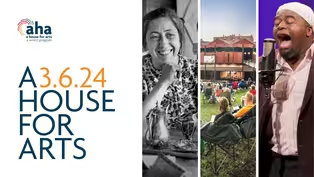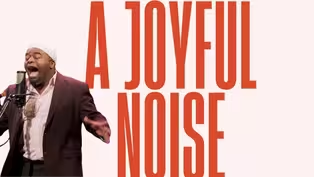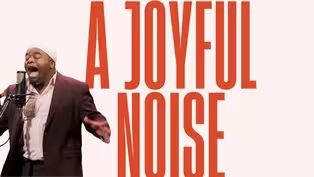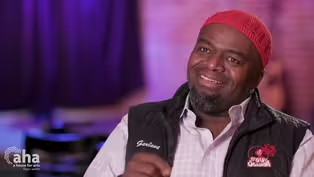
Inside SPAC's Upcoming 2024 Spring Season
Clip: Season 9 Episode 14 | 11m 17sVideo has Closed Captions
Chris offers a behind-the-scenes look at creative processes & upcoming 2024 SPAC season.
Join Chris Shiley as he delves into the intricate world of artistic planning at Saratoga Performing Arts Center (SPAC). From his beginnings as a professional trumpet player to orchestrating diverse performances, Chris offers a behind-the-scenes look at the creative process and a preview of the upcoming 2024 season at SPAC.
Problems playing video? | Closed Captioning Feedback
Problems playing video? | Closed Captioning Feedback
AHA! A House for Arts is a local public television program presented by WMHT
Support provided by the New York State Council on the Arts (NYSCA), M&T Bank, the Leo Cox Beach Philanthropic Foundation, and is also provided by contributors to the WMHT Venture...

Inside SPAC's Upcoming 2024 Spring Season
Clip: Season 9 Episode 14 | 11m 17sVideo has Closed Captions
Join Chris Shiley as he delves into the intricate world of artistic planning at Saratoga Performing Arts Center (SPAC). From his beginnings as a professional trumpet player to orchestrating diverse performances, Chris offers a behind-the-scenes look at the creative process and a preview of the upcoming 2024 season at SPAC.
Problems playing video? | Closed Captioning Feedback
How to Watch AHA! A House for Arts
AHA! A House for Arts is available to stream on pbs.org and the free PBS App, available on iPhone, Apple TV, Android TV, Android smartphones, Amazon Fire TV, Amazon Fire Tablet, Roku, Samsung Smart TV, and Vizio.
Providing Support for PBS.org
Learn Moreabout PBS online sponsorship- Thank you, thanks for having me.
- Yeah, so before we dive into your position at SPAC, I wanna learn about you the artists.
So what's one of your, like main artistic passions and focuses you would say?
- Probably my main is music, in just in general, it's a broad obviously answer.
But specifically classical music, and that's a lotta my background.
I was a professional trumpet player for many years, and studied classical music as a performer.
But really beyond that, just music in general, any good music is really where a big passion of mine, and what drives me.
- And you say you focus on the trumpet, is that like your main instrument focus that you kinda play around with, is the trumpet?
- That was my main, yeah that's what I went to school for, that's what I studied, that's what I did, that was my all day every day for many years, you know four or five hours a day in a little room with me and a trumpet just practicing and working on it, so yeah-- - How'd your parents feel about that?
(Jade laughs) - Yeah, they were very supportive, I was very lucky 'cause the trumpet is not an easy instrument to start, it's pretty loud, and not very pretty in the initial phases, in particular.
So they were pretty supportive of just some loud honking noises coming from my room for a while while I figured it out so.
- Yeah, I can only imagine.
Why the trumpet for you?
- Well, it really wasn't my first choice in all honesty, my first choice was saxophone, I wanted to play jazz sax.
But as I was going through the process in band when I was maybe 12 or something, the band director needed trumpet players, and I was able to make a sound on the mouth piece, and so they wanted to have me try trumpet for a year, and if I didn't like it they would switch.
But obviously I took to it and kinda stuck with it from there.
I think it's a really versatile instrument through, as I learn more and more about it, you know you can play jazz, you can play Broadway, you can play pops music, you can play classical, and orchestral, you can do chamber music.
So there's a lotta things that you can do with it that make it really fun, and allow you to have like a really varied sort of career as you perform.
- Nice.
- So.
- Is that why you stuck with it?
- Yeah I think so, I think so.
I think it also like, you know for me art, it's just a self expression, and it became the medium by which I express myself.
So, I have a feeling, whatever instrument I end, if I'd gone with saxophone, or if I'd gone with cello, or French horn or something, like I probably would've stuck with it.
'Cause I think for me, it was more about just having a way to express myself so.
- And I know you did a lot of freelancing as a trumpeter, like how was that?
What was life as a freelance trumpeter?
If you could like paint that picture for us?
- Yeah, I mean the life of any freelance artist I think is a grind.
- [Jade] Yes it is.
- Yeah, as I'm sure you know.
So, it was, to my earlier point, it was varied.
It was, what was great about it was 'cause you can play so many different genres, and different styles, every day was a different gig and a different experience.
And I was one day playing in a Broadway pit, and then the next day playing in a band, and the next day playing with an orchestra, and then playing a chamber music, doing a recital.
So every day was something different, which was great, it was also exhausting and a grind.
And as you know as a freelancer, like there's a lotta time in the car, there's a lotta time by yourself just kinda goin' from gig to gig.
It's a tough job to have I think, as a freelancer, It's a tough job to have I think, as a freelancer, but what I loved about it as a trumpet player was just how much variety I could have.
- Oh yeah, I bet so much, as you just mention.
So that kinda just leads us into your position at SPAC.
So why don't you give us a little bit of this, the non freelancer.
(Jade laughs) - Yeah, so as I mention, you know freelancing is just a grind.
And after doing that for a while, I was kinda thinking about like my future, and did I wanna keep doing that, or did I wanna try to do something else.
And I had always had an eye And I had always had an eye for like logistics and operations as well.
And as a freelancer, And as a freelancer, you actually have to do a lotta that stuff yourself anyways, contracts and things, kind of end up you know, unless you have a management team which is way down the road you're doing a lotta that yourself.
So I kinda got more interested in that side of things, and started to pursue opportunities with some different organizations, focused really on operations and logistics.
I did that for many years as well, and got to travel the world doing different logistical you know gigs so-to-speak.
And then when it came to SPAC, there was this opportunity to take over the role of artistic planning, and that's my title there, I'm VP of Artistic Planning.
Which is really kinda combining both, it's combining that sort of creative artistic side of performing, and that self expression, and then also balancing it with all the logistics that it takes to actually execute all the shows that we do at SPAC.
So.
- So is that how you would define artistic planning?
- Yeah, I think so, I think it's a mix.
It's understanding the repertoire, it's curating a season in collaboration with several partners, and having a sort of artistic voice, but then also, once that side of it is done, sitting down and going, "Okay, now how are we going to actually do all of this?"
You know.
- Oh wow, yeah big position there.
(Jade laughs) - Yeah, it's a lot.
- So in your opinion, what makes a great artistic planner?
(Christopher sighs) - I think you have to, first of all you have to be able to manage just a lot of details, and really think in a broad picture, I think that's important.
You know you've gotta think about from a curating side, you've gotta think about a whole season, not just one show, but how that show impacts the next show, and the next show, and the next show.
So I think that's an important component of the job.
I think you also work closely with a lotta different people.
I work with a lotta different be it musicians, artists, administrators from the organizations that we work with, like Philadelphia Orchestra, and New York City Ballet.
You know we have these great partners, and I have to work very closely with them, so I think a good artistic administrator and artistic planner has to sort of be able to hear everyone's concerns, and hear everyone's viewpoints, to hear everyone's concerns, and hear everyone's viewpoints, and kinda balance those, and work towards the result that in the end is best for SPAC and best for Saratoga.
So it's a bit of a balancing act, and I think that's a big part of the job.
- Yeah, I can see that, (Jade laughs) 100%.
You're basically curating the whole energy and connection piece of these concerts, performances, and programs, correct?
- Yeah, I mean we're really trying to think at SPAC, with our partners as I just mentioned at the ballet, and the orchestra, and chamber music, we're really trying to think about what is the arc of their season when they come?
We're fortunate to have these great companies every summer, and we really want each summer to feel unique.
And so we think about, what's it like when they arrive, and the excitement there, and how do they start their residency?
And how does it sort of arc to the end of their residency when they're finished and leaving?
And how do we end in a way that feels like we've kind of book ended the season, but also leave with some excitement, and get people excited to wanna come back again next year?
- So how do you build that excitement, and build that uniqueness?
- There's a lotta different ways that we do it.
I mean we do it through the repertoire, obviously, through the soloists that we bring to the stage, through presenting classic works that people know, and love, and are excited to see.
Presenting new works that maybe people are completely unfamiliar with, but get to experience something they've never thought imaginable before.
So there's like a lotta ways that we try to generate excitement in the season.
And I think variety is key in that process.
You know you wanna make sure that you try to have something for everybody, that's one of our sort of slogans behind the scenes at SPAC.
That we really want somebody, everybody to find something for themselves on the season.
And that's hard to do, because there's a lotta people, and a lotta different feelings and opinions out there.
But we really try to make sure we cast a wide net with our programming and what we're bringing.
- Yeah, and New York is such a like, artistically artistic and culturally diverse area too, so I know that can be a challenge, but you guys are really hitting the nail on the head with it though.
- Yeah, thank you, well it's an ongoing process, for sure.
- I wanna talk about, was it Spa Little Theater, is that what it's called?
Give us a background on that, and I wanna know the type of programming and events you guys have coming up.
- Yeah, oh it's been, that's a relatively new space to us at SPAC.
And I think you know, a lotta people hear SPAC, and they think the amphitheater, and that's the you know amazing space, and a huge space, and obviously we do a lotta great programming there.
But it's also a limiting space because it's so big, right, you have over 5,000 seats, a capacity of over 20,000 people at the amphitheater.
You have to have huge shows to do events in that space.
And there's a lotta great artists out there with really unique viewpoints, and really interesting things to say, who maybe don't have shows or productions that fit in a stage that is 90 feet wide you know?
- [Jade] Yeah, 5,000 seats yeah.
- And 5,000 seats.
And so, a couple years ago we were given the opportunity to start to program the Spa Little Theater, which is a 500 seat venue, it's a great acoustic, it's a really intimate space.
And it's great, it's 500 seats but it feels like it's about 200 seats.
So it's got this really great energy in there, and it's given us the opportunity at SPAC, to bring a lotta artists to the region who haven't been here before, and who have something unique to share, and artists that we've had our eye on for a long time but we've been unable to bring because we were kinda limited by just the vastness of the amphitheater.
So to now have those two spaces kind of running in tandem is just a great opportunity, and it means SPAC really is a year round performing arts center now.
We don't get any time off anymore.
We-- - Oh wow.
(Jade laughs) - Yeah, we start, the Spa Little Theater is kind of October to May, and then summer is May to September, and maybe there's three weeks in September, and then we start all over again so.
- Busy busy busy.
- It is busy, but it's exciting to also be able to connect with the community around now, and not feel like we just kinda go away for nine months a year like it was in the summer you know.
- Bring people in, create access.
And so, what type of future programing and events is the spa little theater gonna have, and SPAC as well, you know just overall, just some things that people should look forward to?
- Yeah, well we've got a great spring season starting in March in the Spa Little Theater.
And we are presenting Ballet X, which is a modern dance company in there.
They have an incredible commitment to new work, and to contemporary voices, and modern voices.
And so we're really excited to have them, they are just a phenomenal company, and I think are gonna blow people away.
Dance in that space is really amazing, just cause it is so intimate.
We have Chamber Music Society of Lincoln Center, they've been our partner for a long time.
And we've now gone to a year round format with them since we now have the Spa Little Theater, which has been fantastic.
We have Zakir Hussain, one of the greatest percussionists to ever live coming to play in that space.
And again, to get to hear someone of his stature and reputation in such an intimate space I think is gonna be amazing.
So you know we have an incredible spring season in the little theater that we're very excited about.
And then we have our summer season with New York City Ballet, Philadelphia Orchestra.
All those programs we're so excited to be bringing this summer, they're gonna be incredible residencies.
There's so much variety on each season that we're just really excited to kinda continue to grow and build those residencies in that programming as well.
And that'll start in you know June and July for us.
And we also have our jazz fest as well, which is always just an incredible incredibly fun event so.
- Yeah I can't wait to go to that one, it's gonna be great.
And thank you Chris for giving us a little glimpse into your world.
And I appreciate you for taking the time to talk to us today.
- Yeah absolutely, thanks so much for having me.
- Thank you.
- Thank you.
Discovering Gospel Music's Roots in NY's Capital | Preview
Video has Closed Captions
Preview: S9 Ep14 | 30s | The sounds of gospel music, insights into SPAC's artistic planning & vibrant performances. (30s)
A Joyful Noise Performs 'Blessed Assurance' Live
Video has Closed Captions
Clip: S9 Ep14 | 4m 14s | Experience the soul-stirring rendition of "Blessed Assurance" by A Joyful Noise. (4m 14s)
A Joyful Noise Performs 'I Don't Know What You Come To Do'
Video has Closed Captions
Clip: S9 Ep14 | 2m 51s | Experience the soul-stirring rendition of "I Don't Know What You Come " by A Joyful Noise. (2m 51s)
The Legacy of Gospel Music in NY's Captial Region
Video has Closed Captions
Clip: S9 Ep14 | 4m 59s | The journey of gospel music in NY's Capital Region,featuring Garland Nelson at Caffè Lena. (4m 59s)
Providing Support for PBS.org
Learn Moreabout PBS online sponsorship
- Arts and Music
The Best of the Joy of Painting with Bob Ross
A pop icon, Bob Ross offers soothing words of wisdom as he paints captivating landscapes.













Support for PBS provided by:
AHA! A House for Arts is a local public television program presented by WMHT
Support provided by the New York State Council on the Arts (NYSCA), M&T Bank, the Leo Cox Beach Philanthropic Foundation, and is also provided by contributors to the WMHT Venture...




